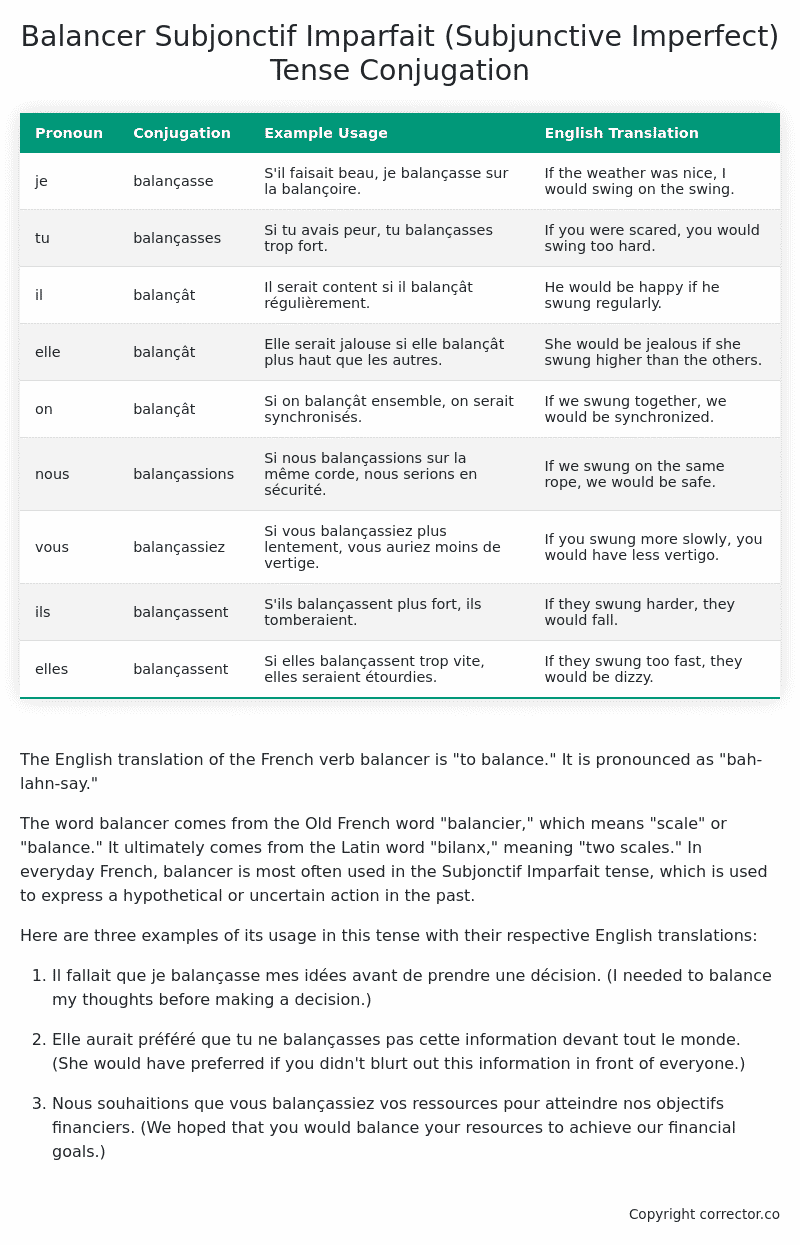Subjonctif Imparfait (Subjunctive Imperfect) Tense Conjugation of the French Verb balancer
Introduction to the verb balancer
The English translation of the French verb balancer is “to balance.” It is pronounced as “bah-lahn-say.”
The word balancer comes from the Old French word “balancier,” which means “scale” or “balance.” It ultimately comes from the Latin word “bilanx,” meaning “two scales.” In everyday French, balancer is most often used in the Subjonctif Imparfait tense, which is used to express a hypothetical or uncertain action in the past.
Here are three examples of its usage in this tense with their respective English translations:
-
Il fallait que je balançasse mes idées avant de prendre une décision. (I needed to balance my thoughts before making a decision.)
-
Elle aurait préféré que tu ne balançasses pas cette information devant tout le monde. (She would have preferred if you didn’t blurt out this information in front of everyone.)
-
Nous souhaitions que vous balançassiez vos ressources pour atteindre nos objectifs financiers. (We hoped that you would balance your resources to achieve our financial goals.)
Table of the Subjonctif Imparfait (Subjunctive Imperfect) Tense Conjugation of balancer
| Pronoun | Conjugation | Example Usage | English Translation |
|---|---|---|---|
| je | balançasse | S’il faisait beau, je balançasse sur la balançoire. | If the weather was nice, I would swing on the swing. |
| tu | balançasses | Si tu avais peur, tu balançasses trop fort. | If you were scared, you would swing too hard. |
| il | balançât | Il serait content si il balançât régulièrement. | He would be happy if he swung regularly. |
| elle | balançât | Elle serait jalouse si elle balançât plus haut que les autres. | She would be jealous if she swung higher than the others. |
| on | balançât | Si on balançât ensemble, on serait synchronisés. | If we swung together, we would be synchronized. |
| nous | balançassions | Si nous balançassions sur la même corde, nous serions en sécurité. | If we swung on the same rope, we would be safe. |
| vous | balançassiez | Si vous balançassiez plus lentement, vous auriez moins de vertige. | If you swung more slowly, you would have less vertigo. |
| ils | balançassent | S’ils balançassent plus fort, ils tomberaient. | If they swung harder, they would fall. |
| elles | balançassent | Si elles balançassent trop vite, elles seraient étourdies. | If they swung too fast, they would be dizzy. |
Other Conjugations for Balancer.
Le Present (Present Tense) Conjugation of the French Verb balancer
Imparfait (Imperfect) Tense Conjugation of the French Verb balancer
Passé Simple (Simple Past) Tense Conjugation of the French Verb balancer
Passé Composé (Present Perfect) Tense Conjugation of the French Verb balancer
Futur Simple (Simple Future) Tense Conjugation of the French Verb balancer
Futur Proche (Near Future) Tense Conjugation of the French Verb balancer
Plus-que-parfait (Pluperfect) Tense Conjugation of the French Verb balancer
Passé Antérieur (Past Anterior) Tense Conjugation of the French Verb balancer
Futur Antérieur (Future Anterior) Tense Conjugation of the French Verb balancer
Subjonctif Présent (Subjunctive Present) Tense Conjugation of the French Verb balancer
Subjonctif Passé (Subjunctive Past) Tense Conjugation of the French Verb balancer
Subjonctif Imparfait (Subjunctive Imperfect) Tense Conjugation of the French Verb balancer (this article)
Subjonctif Plus-que-parfait (Subjunctive Pluperfect) Tense Conjugation of the French Verb balancer
Conditionnel Présent (Conditional Present) Tense Conjugation of the French Verb balancer
Conditionnel Passé (Conditional Past) Tense Conjugation of the French Verb balancer
L’impératif Présent (Imperative Present) Tense Conjugation of the French Verb balancer
L’infinitif Présent (Infinitive Present) Tense Conjugation of the French Verb balancer
Struggling with French verbs or the language in general? Why not use our free French Grammar Checker – no registration required!
Get a FREE Download Study Sheet of this Conjugation 🔥
Simply right click the image below, click “save image” and get your free reference for the balancer Subjonctif Imparfait tense conjugation!

Balancer – About the French Subjonctif Imparfait (Subjunctive Imperfect) Tense
Formation
Common Everyday Usage Patterns
Interactions with Other Tenses
Subjonctif Présent
Indicatif Passé Composé
Conditional
Conditional Perfect
Summary
I hope you enjoyed this article on the verb balancer. Still in a learning mood? Check out another TOTALLY random French verb conjugation!


